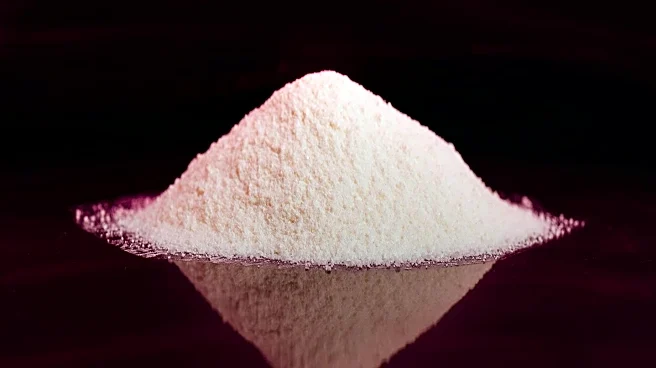What's Happening?
Consumer Reports has released findings indicating that more than two-thirds of the 23 protein supplements tested contain unsafe levels of lead. This revelation raises significant health concerns for millions
of Americans who consume these products as part of their fitness or dietary regimens. The investigation included a variety of protein powders and shakes, with plant-based powders showing the highest levels of contamination. Notably, Naked Nutrition's Vegan Mass Gainer and Huel's Black Edition powders were identified as having lead concentrations exceeding Consumer Reports' level of concern by over 1,200 percent. The report highlights the lack of mandatory federal standards regulating heavy metal contamination in supplements, emphasizing the need for third-party testing and transparency.
Why It's Important?
Lead contamination in food products poses serious health risks, particularly for vulnerable groups. High levels of lead exposure can lead to kidney dysfunction in adults and developmental delays and neurological damage in children. The findings from Consumer Reports are concerning as they expose consumers to hidden risks in pursuit of wellness goals. The lack of federal regulation on heavy metals in supplements means consumers must rely on companies' voluntary testing and transparency. This situation underscores the importance of third-party quality certification to ensure consumer safety.
What's Next?
Consumer Reports has initiated a petition urging the FDA to establish enforceable limits on lead levels in protein powders and shakes. Currently, the FDA has guidelines for lead in baby food but not for adult supplements. Without specific regulation, the responsibility for ensuring product safety remains largely with individual companies. Experts recommend that consumers scrutinize product testing transparency and favor supplements that undergo third-party quality certification.
Beyond the Headlines
The issue of lead contamination in protein powders highlights broader concerns about the regulation of dietary supplements in the U.S. The absence of mandatory testing for contaminants before products reach the market raises ethical questions about consumer protection. This situation may prompt discussions on the need for stricter regulatory frameworks to safeguard public health.









